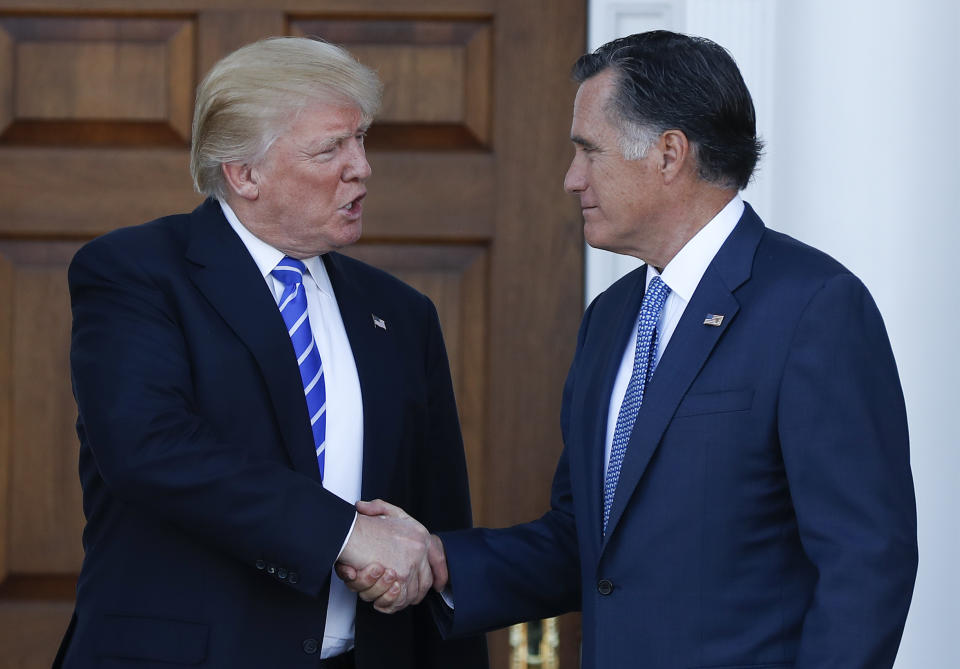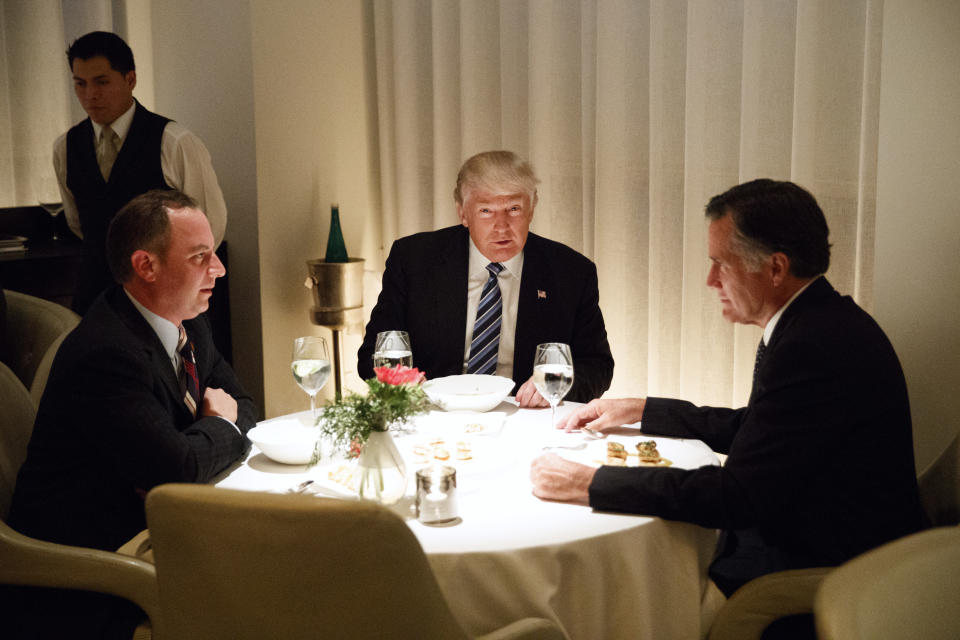Romney and Trump have a long-running love-hate relationship
Sen. Mitt Romney’s dramatic speech on Wednesday announcing he would vote to convict President Trump for abuse of power is the latest salvo in a contentious relationship between the two Republican politicians, and will certainly not be the last.
“Corrupting an election to keep oneself in office is perhaps the most abusive and destructive violation of one’s oath of office that I can imagine,” Romney, the junior senator from Utah, said in reference to Trump’s attempts to secure a Ukrainian investigation of former Vice President Joe Biden.
Romney’s decision extinguished Trump’s argument that his impeachment for a “perfect call” with Ukrainian President Volodymyr Zelensky was merely a partisan political exercise. But it also followed a years-long pattern of animosity, alternating with awkward episodes of reconciliation, between the two men.
“Mitt is tough, he’s sharp, he’s smart,” Trump said of Romney in 2012, when he shook his hand at the Trump hotel in Las Vegas, and endorsed him for president.

In response, Romney warmly praised the reality television star and real estate developer as having “an extraordinary ability to understand how the economy works.”
“It means a great deal to me to have the endorsement of Mr. Trump,” Romney added.
But the day after Romney’s defeat in the general election to President Obama, Trump turned on Romney, saying “he just never connected with people.”
Two years later, Trump began what became a mantra of criticizing Romney for that defeat, tweeting, “He had his chance and blew it in the last weeks of the race.”

When Trump declared himself a candidate for president in 2015, Romney began voicing his disagreement with the billionaire over his criticism of Sen. John McCain’s military service as well as his description of Mexican immigrants as “rapists.”
That led trump to fire back on Twitter.
Why would anybody listen to @MittRomney? He lost an election that should have easily been won against Obama. By the way,so did John McCain!
— Donald J. Trump (@realDonaldTrump) July 18, 2015
Two months later, Romney gave a speech at Georgetown University in which he again blasted Trump and made a prediction shared by numerous other establishment Republicans at the time:
“Donald Trump will not be the nominee. Ultimately our nominee will come from the mainstream conservative bracket,” Romney said.
In response, Trump tweeted that in losing to Obama, Romney “choked.”
As the 2016 campaign progressed, Romney called on Trump to release his tax returns, a request Trump refused and said made Romney “look like a fool.”
Romney then had his own Shakespearean retort.
Methinks the Donald doth protest too much. Show voters your back taxes, @realDonaldTrump. #WhatIsHeHiding
— Mitt Romney (@MittRomney) February 25, 2016
As Trump’s march to the Republican nomination progressed, Romney in March attacked Trump as a “con man and a fake” in an impassioned speech at the University of Utah.
“Let me put it very plainly,” Romney said, “if we Republicans choose Donald Trump as our nominee, the prospect for a safe and prosperous future are greatly diminished.”
Trump responded that Romney had accepted his endorsement in 2012.
Why did Mitt Romney BEG me for my endorsement four years ago?
— Donald J. Trump (@realDonaldTrump) March 3, 2016
Then, a month before the election, the “Access Hollywood” tape surfaced in which Trump boasted about sexually assaulting women, provoking outrage from Romney, a devout Mormon.
“Hitting on married women? Condoning assault? Such vile degradations demean our wives and daughters and corrupt America's face to the world,” Romney tweeted, a view echoed by many mainstream Republicans.

But after Trump’s surprise victory, Romney wished him luck in his new job, tweeting, “Best wishes to our duly elected president.”
Trump noted that Romney had also contacted him personally.
Mitt Romney called to congratulate me on the win. Very nice!
— Donald J. Trump (@realDonaldTrump) November 13, 2016
The president-elect then seemed be considering Romney for one of the most sought-after jobs in his administration, secretary of state. The two men shared a dinner at New York’s Jean-George restaurant at which they reportedly discussed the position.
“I had a wonderful evening with President-elect Trump,” Romney said after the meal. “We had another discussion about affairs throughout the world, and these discussions I’ve had with him have been enlightening and interesting and engaging. I’ve enjoyed them very, very much.”
Whether Trump ever seriously considered appointing Romney is unclear. The post went to former ExxonMobil CEO Rex Tillerson instead.
On Aug. 18, 2017, Romney rebuked Trump over the president’s response to the white nationalist rally in Charlottesville, Va., that left a counterprotester dead. Trump said there were “very fine people on both sides” of the clash.
“Whether he intended to or not, what [Trump] communicated caused racists to rejoice, minorities to weep, and the vast heart of America to mourn,” Romney said in a Facebook post in which he called on the president to apologize.

But six months later, after Romney had announced his bid to run for U.S. Senate in Utah, Trump again endorsed the man he had repeatedly called a “choke artist.” Romney, Trump said in his endorsement, would make a “great senator.”
In response, Romney seemed, once again, to let bygones be bygones.
“Thank you, Mr. President, for the support,” Romney said. “I hope that over the course of the campaign I also earn the support and endorsement of the people of Utah."
Romney won easily, setting the stage for the next reversal in their relationship. He wrote a scathing denunciation of Trump in a Washington Post op-ed.
Citing Trump’s foreign policy blunders, Romney said “his conduct over the past two years, particularly his actions last month, is evidence that the president has not risen to the mantle of the office.”
Trump offered a somewhat muted response to the op-ed, telling Romney to “be a team player.”
“Would much prefer that Mitt focus on Border Security and so many other things where he can be helpful,” Trump said in a tweet. “I won big, and he didn’t. He should be happy for all Republicans. Be a TEAM player & WIN!”
Romney mostly kept his thoughts to himself during the impeachment process, but broke with the president and his party to vote in favor of calling witnesses in the Senate trial, one of only two Republicans to take that position, along with Sen. Susan Collins of Maine. His dramatic announcement that he would vote for one of the two articles of impeachment, while not affecting the outcome of the vote, was certain to enrage Trump, who had boasted of the unanimous Republican support he had enjoyed in the House of Representatives and obviously wanted the same from his party in the Senate.
It almost certainly was the last straw in their relationship.
At least for now.
_____
Read more from Yahoo News:


